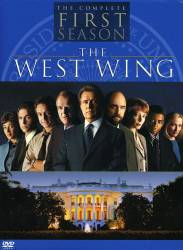Twenty Five - S4-E23
Corrected entry: There are two errors toward the end of the episode. First, the way the 25th Amendment is handled is incorrect. It only covers the manner in which the President may either temporarily turn over powers of the office, or, as spelled out by law, he may be declared unable to continue in that office. In the case of the 25th Amendment, the Vice President becomes Acting President. As to the Speaker of the House taking over, that's not from the 25th, but rather from the 1947 Presidential Succession Act. The second problem concerns the oath that the Speaker took. While it's a little hazy as to whether he has to take the oath of President, as he is NOT, but rather just Acting President (and under 25 the Vice President would not take an oath as he assumes the duties immediately upon proper declaration), if it did happen he would not have put his right hand on the bible and raised his left hand. The tradition and standard is to put the left hand on the bible and raise the right hand toward God.
Evidence of Things Not Seen - S4-E20
Corrected entry: When CJ Cregg is balancing the egg in the final scene, the clock on the wall says midnight, which in the show it is, but her wristwatch shows 7.20.
Correction: Wristwatch batteries go dead and people forget to wind watches, too.
Holy Night - S4-E11
Corrected entry: Toby's father is mentioned as having worked for Murder, Inc; however, the opening scene with him on assignment is set in 1954, while Murder, Inc ceased operations in the mid-forties.
Correction: Murder, Inc. was simply a joke referencing Toby's father's past in the mob business. I really, really doubt that this was a real reference.
There's nothing in the scene to indicate that it was a joke, and the flashback is - apart from the anachronism - reflective of the actual organisation's operations.






Correction: As a lawyer who had was fortunate to befriend his former Dean, the primary author of the 25th Amendment, I am very privy to its details. The Amendment has four sections, not just the one implied by the original author. Section 3 deals with how the President (Bartlet) can remove himself and does not need any cabinet vote. The fourth section, by far the most important, deals with how the majority of the Cabinet, along with the VP, can remove the president from office due to incapacity. Section 1 clarifies some ambiguity in the Constitution over when the VP takes over the Presidency, that he becomes the President, not the "acting President," the label John Tyler was saddled with. And just as the VP would be President, so does the Speaker, or anyone next in line. And Section 3 requires the President to name a successor whenever there is a vacancy in the VP's office. Interestingly, Walken signs a letter of resignation from Congress, saying, "It's illegal to work for two branches of government at the same time." The VP of the Executive Branch is the President of the Senate, the Legislative Branch, and occasionally casts a tie-breaking vote. How is that not working for two branches simultaneously?
Michael Prete